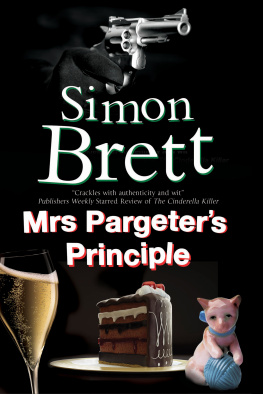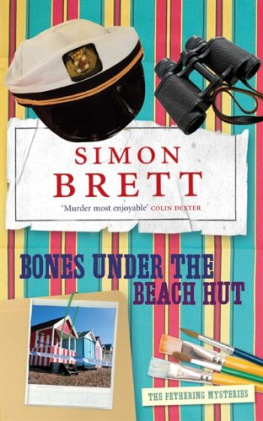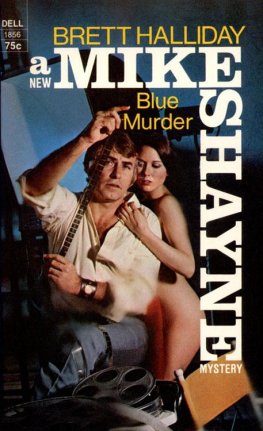Simon Brett - Murder Unprompted
Here you can read online Simon Brett - Murder Unprompted full text of the book (entire story) in english for free. Download pdf and epub, get meaning, cover and reviews about this ebook. genre: Detective and thriller. Description of the work, (preface) as well as reviews are available. Best literature library LitArk.com created for fans of good reading and offers a wide selection of genres:
Romance novel
Science fiction
Adventure
Detective
Science
History
Home and family
Prose
Art
Politics
Computer
Non-fiction
Religion
Business
Children
Humor
Choose a favorite category and find really read worthwhile books. Enjoy immersion in the world of imagination, feel the emotions of the characters or learn something new for yourself, make an fascinating discovery.

- Book:Murder Unprompted
- Author:
- Genre:
- Rating:3 / 5
- Favourites:Add to favourites
- Your mark:
- 60
- 1
- 2
- 3
- 4
- 5
Murder Unprompted: summary, description and annotation
We offer to read an annotation, description, summary or preface (depends on what the author of the book "Murder Unprompted" wrote himself). If you haven't found the necessary information about the book — write in the comments, we will try to find it.
Murder Unprompted — read online for free the complete book (whole text) full work
Below is the text of the book, divided by pages. System saving the place of the last page read, allows you to conveniently read the book "Murder Unprompted" online for free, without having to search again every time where you left off. Put a bookmark, and you can go to the page where you finished reading at any time.
Font size:
Interval:
Bookmark:
Simon Brett
Murder Unprompted
CHAPTER ONE
Charles Paris was in the Number One dressing room.
True, the Number One dressing room at the Princes Theatre, Taunton, was distinguished from the other dressing rooms only by the white plastic numeral screwed on to the door. In size and lack of amenities they were all identical.
And true, Charles was sharing the Number One dressing room with another actor, Alex Household, who had a larger part in the play.
But the fact remained that, for the duration of the three-week run of The Hooded Owl, Charles Paris would be in the Number One dressing room and, though publicly he always affected lack of interest in such petty distinctions (Men are led by toys, he would say, loftily quoting Napoleon), he was secretly delighted. However cynical he appeared, however logical he was about the likelihood of a sudden breakthrough at the age of fifty-four, his actors imagination could still leap in seconds to the pinnacles of theatrical success. Dreams of sudden public recognition of his talents had survived almost unchanged from his teens, and reality, in the form of modest achievements and much resting since he had started in the business in 1949, could make little impression on them.
So, though he would never actually speak of it, even in his most drunken moments (which in his case were quite drunken), Charles still nursed the tiny hope that The Hooded Owl would be the one, the play on whose crest he would ride into the West End, where his true worth would be instantly appreciated, and he would spend the rest of his life reading scripts rather than grabbing any job that came within reach, becoming a regular on television chat shows, participating in Nights of a Thousand Stars for charity, and describing his favourite room to the Observer Colour Supplement.
Since he lived in one room, a dingy bed-sit in Hereford Road, London W.2., this last part of the fantasy had not been fully thought through. In fact, none of it had been fully thought through, because, in small measure, he had tasted success. He had been in long runs in the West End, he had even had his own play running in the West End, he had done bits in television and films, and his logical self knew how insubstantial such satisfactions were.
And yet the fantasies persisted. It was just as it had been in his teens. In the early years of adolescence, he had put down all his feelings of dissatisfaction to the fact that he hadnt got that all-important amulet, a girl-friend. But, to his surprise, at the age of nineteen, after a steady two-year relationship, he had found he was still attributing his discontent to the same cause. Like the horizon, a sense of fulfilment kept its distance, regardless of his position.
But, in spite of that bleak conclusion, hope survived.
Hope for the future of The Hooded Owl was not quite as baseless as it might be for the average production in a provincial theatre. The staple diet of Tauntons theatre-goers was set-book classics, creaking but well-built thrillers and last years West End cast-offs, none of which had any prospects beyond the three weeks of their run. The Hooded Owl, on the other hand, was a new play, and not a bad one at that. If all of the thousands of variables which govern such a process came right, it was not impossible that the play should transfer to the West End.
One person believed that possibility with sufficient conviction to back his belief with money. His name was Paul Lexington, and he called himself a Producer. He certainly had a letterhead on his note-paper to prove it, though details of his actual productions seemed a little less well-defined. He talked confidently of tours he had set up with Music Hall shows and even mentioned putting on a pantomime, though at what level these productions had been mounted, it was difficult to assess. A tour of a Music Hall show could be anything from a glamorous parade of the countrys Number One provincial theatres down to a glorified pub-crawl, with a motley band of barnstormers passing the hat round after a few songs at the piano.
Since Charles Paris had not heard of any major Music Hall tour in the previous few years, he inclined to the opinion that the operations of Paul Lexington Productions had been at the more modest level. On the other hand, impresarios have to start somewhere, Paul Lexington seemed a pleasant and knowledgeable young man and, in a business peopled with the incompetent and the frankly criminal, Charles felt inclined to give him the benefit of the doubt.
After all, without Paul Lexington, he would not be currently employed, and, if there was one thing that Charless experience in the theatre had taught him, it was the inestimable advantage of having a job over resting.
The sequence of events which had brought The Hooded Owl to its first night at the Princes Theatre, Taunton, had been that usual circuitous trip through an obstacle course by which new plays reach the stage. The work had been written by a schoolmaster called Malcolm Harris who, though of undoubted talent, had no contacts in or knowledge of commercial theatre. He had lavished three years of his spare time on the work and, when he had the final draft neatly typed up with a Letrasetted front page and a transparent plastic folder, the only person he could think to send it to was the Professor of English at the university he had left twelve years previously. The Professor. after a few months delay and an apologetically nudging letter from the playwright, had written back in terms of vague praise, which a professional writer would have recognised as a confession of not having read the script, and said he had passed it on to the Professor who headed the universitys recently-inaugurated Drama Department. This gentleman, after a few months delay and an apologetically nudging letter from the playwright, had written back to say he had passed it on to an actor friend who was setting up a new fringe theatre company in Surbiton. After quite a few months delay, and three apologetically nudging letters from the playwright, the actor scribbled a note back, from an address in Gloucestershire, saying he was sorry he hadnt yet had time to read the play. And also he was sorry that he seemed to have lost the manuscript. And, anyway, he had decided that the theatre wasnt for him after all and hed set up an antique shop with a friend.
Phase One of the offensive was thus over, and Phase Two started with the top carbon of the play, a newly-Letrasetted front page and a new transparent plastic folder. This time, on the advice of his wifes mother, whod just read a biography of some playwright out of the library though she couldnt remember what his name was, Malcolm Harris had sent the play to his local repertory theatre. After a few months delay and an apologetically nudging letter from the playwright, the General Manager had returned the script with a duplicated letter, saying thanks very much for sending it, the Play Selection Committee had found it really interesting, but unfortunately it wasnt the sort of show they were looking for at that time, why not try sending it to an agent? This Malcolm Harris had done, but, unfortunately, due to the random selection method of sticking a pin in the Theatrical and Variety Agents section of the Yellow Pages, he had sent it to one who specialised in booking blue comedians and strippers into Working Mens Clubs. After a few months delay and an apologetically nudging letter from the playwright, the script was returned, together with a photograph of Sadie Masso: 38-26-36: Just the Thing to Liven Up your Stag Night or Rugby Club Dinner, in an envelope without a stamp on it. At this point, that infallible source of advice, his wifes mother, told Malcolm Harris that she was sure she had seen something about a play-writing competition in some magazine shed been reading at the hairdressers, why didnt he go in for that? Painstaking research having tracked down the competition, sponsored by a local Arts Festival in the Midlands, the playwright had received his application form and copy of the rules. Obeying these implicitly, he had sent off his manuscript, together with the stamps for return postage and the entrance fee of one pound, and sat and waited. Four months later, he received back through the post a copy of
Font size:
Interval:
Bookmark:
Similar books «Murder Unprompted»
Look at similar books to Murder Unprompted. We have selected literature similar in name and meaning in the hope of providing readers with more options to find new, interesting, not yet read works.
Discussion, reviews of the book Murder Unprompted and just readers' own opinions. Leave your comments, write what you think about the work, its meaning or the main characters. Specify what exactly you liked and what you didn't like, and why you think so.




![Simon Brett [Simon Brett] - Mrs., Presumed Dead](/uploads/posts/book/142159/thumbs/simon-brett-simon-brett-mrs-presumed-dead.jpg)
![Simon Brett [Simon Brett] - Mrs. Pargeter’s Pound of Flesh](/uploads/posts/book/142156/thumbs/simon-brett-simon-brett-mrs-pargeter-s-pound.jpg)
![Simon Brett [Simon Brett] - Mrs. Pargeter’s Point of Honour](/uploads/posts/book/142155/thumbs/simon-brett-simon-brett-mrs-pargeter-s-point.jpg)
![Simon Brett [Simon Brett] - Mrs. Pargeter’s Plot](/uploads/posts/book/142154/thumbs/simon-brett-simon-brett-mrs-pargeter-s-plot.jpg)
![Simon Brett [Simon Brett] - Mrs. Pargeter’s Package](/uploads/posts/book/142153/thumbs/simon-brett-simon-brett-mrs-pargeter-s.jpg)
![Simon Brett [Simon Brett] - A Nice Class of Corpse](/uploads/posts/book/142089/thumbs/simon-brett-simon-brett-a-nice-class-of-corpse.jpg)